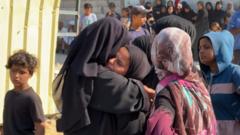Gaza is grappling with a severe humanitarian crisis, with claims of starvation spreading as tensions escalate.
**Gaza Faces Severe Humanitarian Crisis Amid Starvation Claims**

**Gaza Faces Severe Humanitarian Crisis Amid Starvation Claims**
*Former President Trump highlights the dire situation in Gaza as UN officials warn of escalating malnutrition.*
In a stark reflection of the dire conditions in Gaza, former U.S. President Donald Trump characterized the situation as one of "real starvation," countering Israeli Prime Minister Benjamin Netanyahu's insistence that such claims are unfounded. Speaking at a meeting with UK Prime Minister Keir Starmer, Trump, without specifying details, remarked on the visible suffering of children in the affected region: "Nobody's done anything great over there. The whole place is a mess."
This statement coincides with increasing concerns voiced by UN humanitarian chief Tom Fletcher, who notably stated that vast amounts of food and aid are urgently required to prevent further starvation in region. Fletcher emphasized that recent deliveries were merely "a drop in the ocean" relative to the overwhelming needs for assistance, and he welcomed a limited increase in aid—such as tactical ceasefires and coordinated food drops—but highlighted that it was insufficient to address the crisis adequately.
Fletcher reported that approximately 120 truckloads of food were allowed into Gaza during a designated humanitarian pause, but these efforts must scale up significantly to meet the needs of the population. Since the onset of military conflict, malnutrition has surged, with the Hamas-controlled health ministry reporting 147 deaths related to malnutrition, including 88 children. The situation deteriorated significantly following the escalation of conflict that began on October 7, 2023.
Israeli officials have denied allegations of systematic starvation and assert that their military operations have included measures allowing for humanitarian assistance, targeting the narratives that portray Israel as responsible for the food shortages.
Despite the military's acknowledgment of the need for humanitarian support, reports indicate that many food lorries entering Gaza were looted by desperate civilians, adding to the complexities surrounding aid distribution. Tom Fletcher confirmed that bureaucratic and security obstacles complicate the operation, with drivers often facing risks of violence.
Calls for an extended ceasefire are growing, suggesting that a short-term tactical pause—while a positive step—will not suffice to alleviate the extreme food scarcity and malnutrition levels. Meanwhile, the World Health Organization reported alarming spikes in malnutrition-related deaths, emphasizing the urgency of addressing the humanitarian crisis, which they labeled as preventable.
As international developments unfold, the Israeli government continues to refute claims of starvation and maintains that Hamas is impeding the distribution of humanitarian aid. The humanitarian situation in Gaza remains precarious, with calls for a comprehensive and lasting solution to end the ongoing conflict and support the beleaguered civilian population.
This statement coincides with increasing concerns voiced by UN humanitarian chief Tom Fletcher, who notably stated that vast amounts of food and aid are urgently required to prevent further starvation in region. Fletcher emphasized that recent deliveries were merely "a drop in the ocean" relative to the overwhelming needs for assistance, and he welcomed a limited increase in aid—such as tactical ceasefires and coordinated food drops—but highlighted that it was insufficient to address the crisis adequately.
Fletcher reported that approximately 120 truckloads of food were allowed into Gaza during a designated humanitarian pause, but these efforts must scale up significantly to meet the needs of the population. Since the onset of military conflict, malnutrition has surged, with the Hamas-controlled health ministry reporting 147 deaths related to malnutrition, including 88 children. The situation deteriorated significantly following the escalation of conflict that began on October 7, 2023.
Israeli officials have denied allegations of systematic starvation and assert that their military operations have included measures allowing for humanitarian assistance, targeting the narratives that portray Israel as responsible for the food shortages.
Despite the military's acknowledgment of the need for humanitarian support, reports indicate that many food lorries entering Gaza were looted by desperate civilians, adding to the complexities surrounding aid distribution. Tom Fletcher confirmed that bureaucratic and security obstacles complicate the operation, with drivers often facing risks of violence.
Calls for an extended ceasefire are growing, suggesting that a short-term tactical pause—while a positive step—will not suffice to alleviate the extreme food scarcity and malnutrition levels. Meanwhile, the World Health Organization reported alarming spikes in malnutrition-related deaths, emphasizing the urgency of addressing the humanitarian crisis, which they labeled as preventable.
As international developments unfold, the Israeli government continues to refute claims of starvation and maintains that Hamas is impeding the distribution of humanitarian aid. The humanitarian situation in Gaza remains precarious, with calls for a comprehensive and lasting solution to end the ongoing conflict and support the beleaguered civilian population.





















